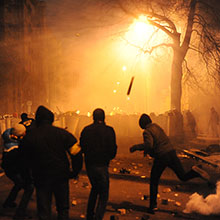Editors' Note
This issue of Mediations is broadly concerned with the ways Marxism is reflected and refracted in the lives and ideas of activists, philosophers, and citizens as a way of thinking about and acting in the world. Jim Holstun’s “Antigone Becomes Jocasta” introduces us to Soha Bechara, a Lebanese political prisoner and activist whose prison memoirs resist the tropes and conventions expected of a Middle Eastern woman engaged in violent revolution: Bechara, Holstun argues, refused to engage in sectarian conflict during the Civil War, resisted being made a female martyr by the Lebanese Communist Party after her attempted assassination of SLA leader Antoine Lahad, and remained committed to revolutionary praxis during her eleven-year imprisonment. Bechara’s perspective on Middle Eastern geopolitical conflict offers readers a startling new perspective on what is at stake in the region and, more important perhaps for the Marxist Literary Group, what is at stake in literary presentations of the region. When her story is taken up by non-Marxists, all that makes it exceptional disappears; Incendies, the play (perhaps) based on her life, turns her from an active communist revolutionary to a passive victim of senseless Middle Eastern violence. As she is transformed from Antigone — a woman whose ethical and political practices might reshape the world — to Jocasta — a victim of the whims of powerful forces over which she has no control — all that is revolutionary about Bechara’s life is lost.
The next article also points to the expansive potential of global Marxism, both as it is practiced and as it is represented. In “Jameson Among the Contras,” James Christie undertakes a new reading of Fredric Jameson’s seminal “Third-World Literature in the Era of Multinational Capital.” By considering biographical details of Jameson’s life — his trips to Cuba and Nicaragua, and his relationships with artists and activists in those nations — Christie provides us a new way of thinking about a first-world critic’s relationship to the art and politics of the Global South. The article periodizes Jameson’s encounter with the Third World at the inception of the Reagan doctrine and, thus, at the beginning of a new phase of US imperialism to go with a new phase of global capitalism. Christie’s periodization is an insightful reading of an essay that has never ceased to be a touchstone (and lightning rod) for Marxist and postcolonial critics. Further, like Holstun, Christie understands the work of Marxism — here, Marxist criticism — as life’s work, as inseparable from one’s writing and politics as it is from one’s ethics.
Malcolm Read presents another thread of global Marxism in his essay-review of Juan Carlos Rodríguez’s De que hablamos cuando hablamos de marxismo. Detailing Rodríguez’s career from the 1970s to the present and offering some explanation for why he remains largely unknown in Anglophone Marxism, Read reveals why Rodríguez’s Marxism — inflected both by the political situation in Spain and his commitment to Althusser — should be considered a major contribution to Marxist thought in the twentieth and twenty-first centuries. The breadth of the article is consonant with the breadth of Rodríguez’s work, ranging over Spanish history, encounters with British Marxism and Critical Realism, and literary figures like Góngora, Quevedo, and Brecht. At its heart, Read’s contribution articulates the way that national and historical specificity — in this case, the specificity of Spain after fascism — cannot be ignored when we talk about Marxism.
We turn, finally, to Alexander Bove’s elaboration of A. Kiarina Kordela’s 2008 $urplus: Spinoza, Lacan. Through a careful reading of Kordela’s use of the death drive, jouissance, the gaze, and the Other, Bové posits a new way of understanding the relationship between contemporary capitalism, geopolitics, and ethics. Bove’s piece builds on the work of Kordela, Spinoza, Lacan, Žižek, and Levinas to make a startling claim: the mechanisms of late capitalism have transformed the death drive into a narcissistic drive to consume. But the foreclosure of the death drive has a surprising consequence: it is through its disappearance that the violent culture of terrorism emerges, so that what is at stake in any encounter with the Other turns out to be our lives.
– Jen Hedler Phillis, for the Mediations editors
